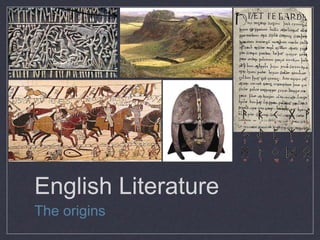
English literature of the different periods in the history of UK
- 2. WHEN WAS THE ENGLISH LANGUAGE BORN?
- 5. CELTIC BRITAIN TWO CELTIC MIGRATIONS: - 7TH CENTURY B.C. - 4TH CENTURY B.C. GAELS Later called ‘Scots’ by the Romans BRITONS
- 6. WHERE DID THE CELTS COME FROM? CELTIC BRITAIN
- 7. THE CELTS DIDN’T KNOW TO BE CELTS! They never formed a unified ethnic group CELTIC BRITAIN
- 8. 1. Were organised in clans and tribes. 2. Had religious and political leaders: the druids. 3. Were Pagans. Their religion was known as “animism” (Latin for “spirit”). 4. Their language was the Gaelic. THE CELTS CELTIC BRITAIN
- 9. ROMAN BRITAIN ROMAN EMPEROR Julius Caesar INVADED BRITAIN FIRST IN 55 AND THEN IN 54 B.C.
- 10. ROMAN BRITAIN 43 A.D. EMPEROR CLAUDIUS CONQUERS BRITAIN He was unable to subdue Scotland because he met with the resistance of the Picts and the Scots
- 11. ROMAN BRITAIN 121 A.D. EMPEROR HADRIAN ERECTS THE WALL
- 12. ROMAN BRITAIN HADRIAN’S WALL: AN EXTRAORDINARY FEAT OF ENGINEERING • 73 miles long • 8-10 feet wide • 15 feet high • 18 millions of specially prepared blocks of stone
- 14. ROMAN BRITAIN THE ROMANS FINALLY WITHDREW IN 410 a.d.
- 15. ROMAN BRITAIN WHAT DID THE ROMAN DOMINATION MEAN FOR BRITAIN? • Civilisation and a law system • Roads • Christianity (possibly, we have little archeological evidence of such early christianisation)
- 16. ROMAN BRITAIN Several cities in Britain have a Roman origin, which can be guessed from the their names Colchester Leicester Chesterfield Lancaster Lincoln Colne Walton Stratford Stratton Portsmouth Portland Latin roots: - Strata via (paved road) - Castrum (camp) - Portus (harbour) - Colonia (military settlement) - Vallus (wall) Other Latin borrowings are such words as: - Wine (‘vinus’) - Cheese (‘caseus’) - Noon (‘nona hora’) - Dish (‘discus’)
- 17. ROMAN BRITAIN LONDINIUM The origins of London • 43 A.D. The Romans built a bridge across the river Thames. • They established a settlement on the north side of the bridge, called Londinium. • Londinuim quickly became an important trading centre (goods were transported by boats on the river).
- 18. ANGLO-SAXON ENGLAND FIFTH CENTURY A.D. GERMANIC INVASIONS After the Romans left Britain, three Germanic tribes invaded the land they were the Angles, the Saxons and the Jutes
- 19. The Angles were called so because they came from a piece of land called the “Angulum”. They settled in the East, in the area which, even nowadays, we call England. ANGLO-SAXON ENGLAND
- 20. THE ANGLO-SAXONS - Were uncivilized barbarians - Were pagans - Spoke a Germanic language (four main dialects: Nurthumbrian, Mercian, Kentish and West Saxon) Roman civilization was wiped out! ANGLO-SAXON ENGLAND
- 21. «Secretum illud quod sola reverentia vident, hoc deum appellant» Tacito, Germania Quella cosa misteriosa che essi intuivano in timore e tremore, questo chiamavano Dio. ANGLO-SAXON ENGLAND
- 22. 2000 B.C REVISION 7th - 4th cent. B.C. 55 and 54 B.C. 43 A.D. 410 A.D. 5th cent. A.D. Iberians Celtic migrations Julius Caesar’s invasions Claudius’ conquest Roman withdrawal Germanic invasions ANGLO-SAXON ENGLAND
- 23. OLD ENGLISH English language is the result of the gradual fusion of the germanic dialects spoken by the Angles, Saxons and Jutes. The early form of English is called Old English. ANGLO-SAXON ENGLAND
- 24. Old English had a particular type of alphabet: the Futhark (or Futhork). The letters of the alphabet were called Runes, from the English ‘Rûn’ (secret) and ‘Runa’ (magician). Old English had cases and inflections. The spelling and the pronunciation of Old English are so different from present-day English that, except for a few words, make it virtually incomprehensible to a modern reader. (The Franks Casket, c. 700) ANGLO-SAXON ENGLAND
- 25. (The Ruthwell Cross, eighth century and its runic inscriptions which spell out passages from ‘The Dream of The Rood’) The ancient Germanic alphabet was largely supplanted by the Latin alphabet after England’s conversion to Christianity between the VIth and VIIth century; but it continued to be employed for inscriptions. ANGLO-SAXON ENGLAND
- 26. Kent Northumberland Mercia Essex East Anglia Wessex Sussex THE ANGLO-SAXON HEPTARCHY ANGLO-SAXON ENGLAND
- 27. «NON ANGLI SED ANGELI» The Venerable Bede is the author of the chronicle ‘Historia Ecclesiastica Gentis Anglorum’ (c. 731). Although it is not always reliable as historiographic source, yet our knowledge of the Anglo-Saxon period would be incomplete without it. Bede reports that Gregory the Great, before becoming Pope, came across a crowd of English slaves and was captured by their fair hair and skin. Apparently, he commented by saying that they were ‘Angels rather than Angles’. Once Pope, he sent St. Augustine of Canterbury to England in 597 A.D. to bring Christianity to the Anglo- Saxons. ANGLO-SAXON ENGLAND
- 28. DANISH INVASIONS The Anglo-Saxons were invaded by the Danes (or Vikings) three times between the 8th and the 11th century. They were pagans and just wanted to exploit the land. The famous Anglo-Saxon King Alfred (later named ‘the Great’) raised an army during the second invasion and defeated the Danes in the battle of Ethandune in 878 A.D. ANGLO-SAXON ENGLAND
- 29. LINK TO «THE HISTORY OF ENGLISH IN TEN MINUTES»: http://www.youtube.com/watch?v=r9Tfbeqyu2U&list=PLA0307 5BAD88B909E
- 30. ANGLO-SAXON ENGLAND TO SUM UP: Old English words have different origins: • The bulk of Old English vocabulary come from the Anglo- Saxon dialects, which gave ‘everyday words’ • Latin had little influence in the first instance (the main evidence is in city names), but it introduced new words after the advent of Christianity. Most English words connected to the Chirstian religion and liturgy come from Latin • The Viking raids too left a mark in the language. Many terms connected to war have a Scandinavian origin